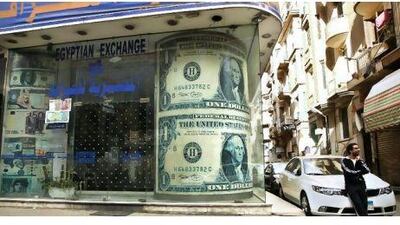Unrest in Egypt is endangering a US$7.68 billion (Dh28.20bn) remittance economy as foreign exchange houses remain closed.
Banks and stock exchanges in Egypt have been closed since Sunday after hundreds of thousands of Egyptians took to the streets, paralysing the country's financial system.
Even before the shutdown, however, exchange-house executives in the UAE say they saw a marked downturn in the amount of money going to the country, potentially putting the brakes on a business the World Bank estimates accounted for 4 per cent of Egypt's GDP last year, or $7.68bn.
"People are afraid to send money because of the situation there," said Arif Abdul Rahman, the operations manager at the Lari Exchange, based in Abu Dhabi. "People are waiting and seeing when the situation calms down."
A large portion of remittances to Egypt comes from the Gulf, Ann Wyman, an analyst at Nomura, said in a recent note. Exchange flows from foreign workers amounted to more than $9bn per year, she estimated, exceeding the value of foreign direct investment into the country.
Official government statistics put foreign investment at about $6.8bn in the 2009-2010 fiscal year.
"Workers' remittances [largely from the Gulf region], which account for more than $9bn in foreign exchange revenues annually, could … be negatively affected as long as the uncertainty persists," Ms Wyman said. Remittances help sustain liquidity in Egypt's banking system and bolster its balance of payments, a measure of trade and investment flows. A severe decline could further hamper an economy already suffering from a flight of capital and concern about financial stability in the wake of the protests. Hosni Mubarak, the president, said late on Tuesday he would leave his position before the end of the year, but his pledge has done little to quell popular unrest or settle jittery markets.
Anger has spread across the region in recent weeks over poverty, youth unemployment, underdeveloped educational systems and high inflation.
"We think the conflict and the ensuing uncertainty may … weigh on Egypt's balance of payments if inward foreign direct investment or remittances were to decrease," Standard & Poor's, the global credit ratings agency, said in a note on Tuesday downgrading the country's debt. Mr Abdul Rahman said the amount of remittances Lari Exchange sent to Egypt had decreased by more than 10 per cent before banks were closed.
Even Western Union, the world's biggest money-transfer service, is closed for business in Egypt.
Mohammed al Ansari, the chairman and managing director of Al Ansari Exchange, one of the largest exchange houses in the UAE, said while some Egyptians were waiting for the political situation to calm down, others were trying hard to get money home.
"When [the banking system] reopens we expect to see a rush to send money," he said. "We have given people an option to send their money but it can't reach their home yet and some prefer to wait and see."
tarnold@thenational

